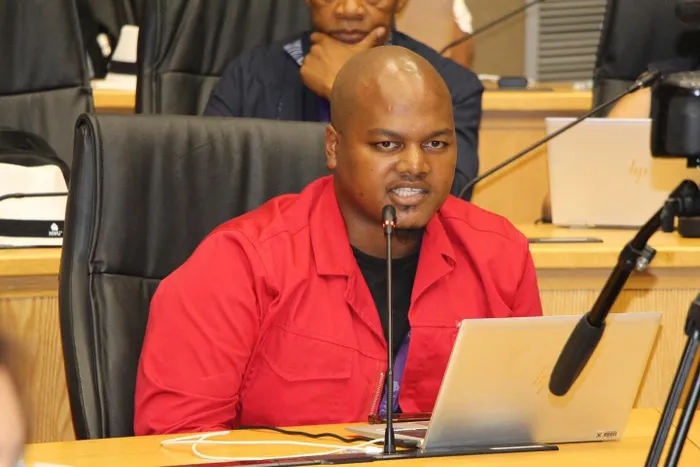
EFF MP Sihle Lonzi has called the DTIC’s proposed student debt regulation a “cruel attack” on poor youth, warning it will entrench poverty by blacklisting students before they graduate.
Image: Sihle Lonzi/ X
The Economic Freedom Fighters (EFF) has written to Parliament urgently opposing a draft regulation by the Department of Trade, Industry and Competition (DTIC), warning it would unleash a “cruel and devastating attack” on poor students by allowing educational institutions to report unpaid student fees to credit bureaus.
In a formal letter addressed to Chairperson of the Portfolio Committee on Higher Education, Tebogo Letsie, EFF Member of Parliament and youth leader Sihle Lonzi warned that the DTIC’s proposed amendment, published in Government Gazette, will further entrench economic exclusion and permanently punish students for being poor.
“We write to you with a deep sense of urgency and responsibility towards the millions of vulnerable youth and students in this country whose futures are under grave threat,” Lonzi said.
He condemned the draft regulation as an unjust measure that would turn unpaid fees into permanent scars on students’ credit records, with serious long-term consequences for graduates trying to build their lives.
“The proposed legislation will be a life sentence, keeping our youth trapped in cycles of poverty and economic exclusion, before they even have a fair chance to build their futures.”
According to Lonzi, the majority of students struggling with unpaid fees come from working-class and poor communities, still burdened by apartheid’s legacy and ongoing structural inequality.
He emphasised that being blacklisted or saddled with a bad credit score is not a minor issue—, t would deny young South Africans access to essentials like housing, car finance, or business loans.
“South African youth will be denied access to essential loans, from starting businesses, buying their first cars, and/or buying their first homes,” Lonzi warned.
The EFF expressed strong concern that such a serious proposal was being pursued without proper coordination between the relevant oversight structures in Parliament.
“It is unimaginable that such a harsh measure is being pursued without meaningful coordination between the Parliamentary Committees responsible for Higher Education and Trade & Industry,” the letter states.
“This is a direct attack on the very principle that education should be a liberating force, not a weapon of punishment.”
The party has called for an urgent joint sitting between the Portfolio Committee on Higher Education and the Portfolio Committee on Trade, Industry and Competition, to scrutinise the regulation and expose what it refers to as an “anti-poor and neoliberal agenda.”
The letter affirms the EFF’s position that student debt should never be used to criminalise the youth, especially when they are victims of structural poverty.
“Our youth deserve an Education System that supports and empowers them, not one that punishes their poverty with lifetime financial scars,” Lonzi said.
The EFF has reiterated its commitment to the Student Debt Cancellation Bill, introduced earlier this year in Parliament, which seeks to cancel historical student debt and allow nearly 300,000 affected graduates to access their qualifications and enter the workforce.
The Bill proposes the cancellation of historical student debt, particularly for students who have completed their qualifications but are blocked from graduating or progressing due to unpaid fees.
The EFF has made it clear that it expects a prompt response and confirmation from Parliament for the joint meeting to be convened.
hope.ntanzi@iol.co.za
IOL Politics
Related Topics: